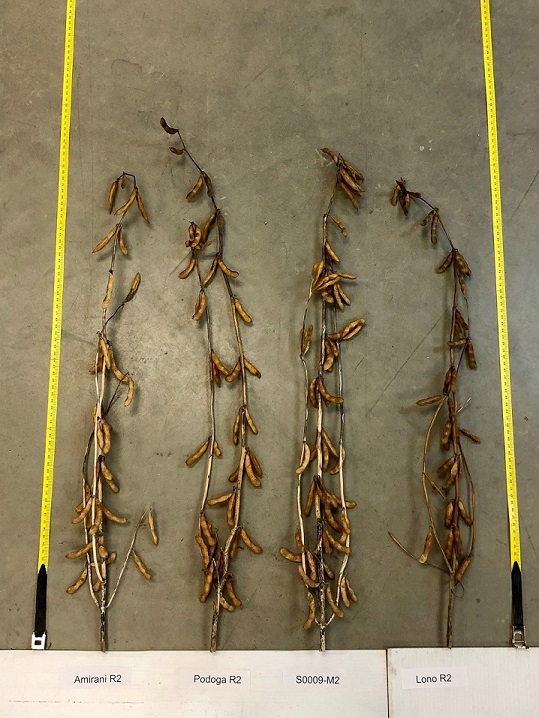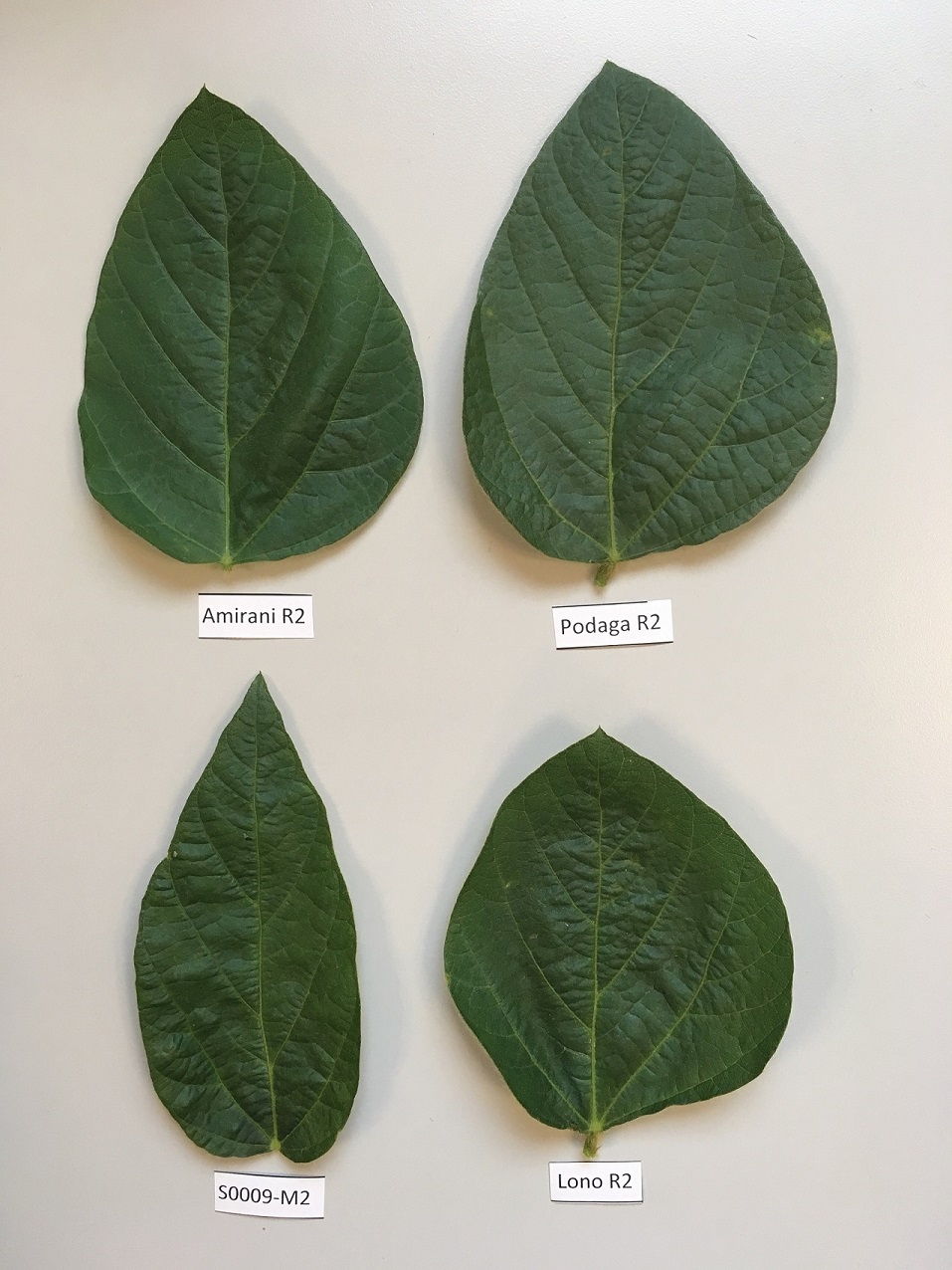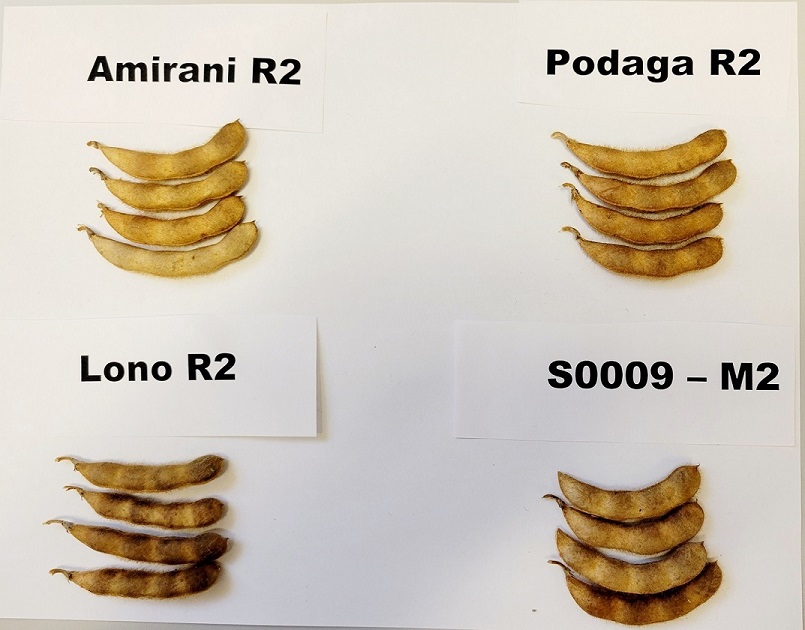Amirani R2
| Denomination: | 'Amirani R2' |
|---|---|
| Botanical Name: | Glycine max |
| Applicant/Holder: |
Sollio Agriculture 19235, avenue Saint-Louis Saint-Hyacinthe, Quebec J2T 5J4 Canada |
| Breeder: |
Jérôme Auclair, Sollio Agriculture, Saint-Hyacinthe, Quebec |
| Application Date: | 2018-12-03 |
| Provisional Protection:: | 2018-12-03 |
| Application Number: | 18-9655 |
| Grant of Rights Date: | 2022-12-21 |
| Certificate Number: | 6713 |
| Grant of Rights Termination Date: | 2042-12-21 |
Variety Description
Varieties used for comparison: 'Lono R2', 'Podaga R2' and 'S0009-M2'
Summary: The anthocyanin colouration on the hypocotyl of 'Amirani R2' is of medium intensity whereas it is strong for 'Lono R2' and weak for 'S0009-M2'. The plants of 'Amirani R2' begin flowering very early while those of 'Podaga R2' begin flowering early in the season. When 95% of the pods are ripe, the plants of 'Amirani R2' are shorter than the plants of 'Podaga R2' and taller than those of 'S0009-M2'. The intensity of brown colour on the pod of 'Amirani R2' is of medium intensity whereas it is dark on the pods of 'Lono R2' and 'S0009-M2'. The plants of 'Amirani R2' mature earlier than those of 'Lono R2' and 'Podaga R2'.
Description:
PLANT: oilseed type, indeterminate growth type, semi-erect branch attitude, tawny pubescence on middle third of main stem, begins flowering very early, matures very early to early season
HYPOCOTYL: medium intensity of anthocyanin colouration
LEAF: pointed ovate lateral leaflet
FLOWER: violet
POD: medium brown
SEED: elongated, yellow ground colour of testa
HILUM: yellow
Origin & Breeding History: 'Amirani R2' (experimental designation C4M17224) originated from a cross between two proprietary selections conducted in 2011, in Saint-Hyacinthe, Quebec. A modified single seed descent method was used to develop the variety. In 2012, the F1 generation, grown in Saint-Hyacinthe, was harvested in bulk and individual plants selected from the F2 generation in 2013 in Elm Creek, Manitoba. In Saint-Hyacinthe, Quebec, row plots of the F3 generation were grown and selected in 2014 followed by plot evaluations from 2015 to 2018. 'Amirani R2' was identified at the F5 generation in 2017. The selection criteria were based on a visual assessment of lodging resistance, number of pods per plant, pod density on the plant (internode length), absence of disease symptoms and protein content.
Tests & Trials: The comparative trials for 'Amirani R2' were conducted at a production farm in Saint-Simon, Quebec. The trials were planted in a RCB design with 4 replicates per variety during the 2019 and 2021 growing seasons. Each 6.0 square metre plot consisted of 4 rows, each 4.5 metres long with a row spacing of 0.38 metres. The seeding density was such that it resulted in a total of 40 plants per variety per square metre. For each variety, the plant height was based on 20 measurements. Mean differences were significant at the 5% probability level based on a Tukey test.
Comparison tables for 'Amirani R2' with reference varieties 'Lono R2', 'Podaga R2' and 'S0009-M2'
Plant height (cm)
| 'Amirani R2' | 'Lono R2' | 'Podaga R2' | 'S0009-M2' | |
|---|---|---|---|---|
| mean 2019 | 77.9 | 74.6 | 82.2 | 74.4 |
| std. deviation 2019 | 3.4 | 4.4 | 4.2 | 3.5 |
| mean 2021 | 62.1 | 61.5 | 68.7 | 57.3 |
| std. deviation 2021 | 4.4 | 2.6 | 2.6 | 6.9 |
Number of days to maturity (from planting to maturity)
| 'Amirani R2' | 'Lono R2' | 'Podaga R2' | 'S0009-M2' | |
|---|---|---|---|---|
| mean 2019 | 96 | 108 | 109 | 104 |
| mean 2021 | 112 | 116 | 118 | 112 |
Click on image for larger view

Soybean: 'Amirani R2' (left) with reference varieties 'Podaga R2' (centre left), 'S0009-M2' (centre right) and 'Lono R2' (right)
Click on image for larger view

Soybean: 'Amirani R2' (top left) with reference varieties 'Podaga R2' (top right), 'S0009-M2' (bottom left) and 'Lono R2' (bottom right)
Click on image for larger view

Soybean: 'Amirani R2' (top left) with reference varieties 'Podaga R2' (top right), 'S0009-M2' (bottom right) and 'Lono R2' (bottom left)
- Date modified: